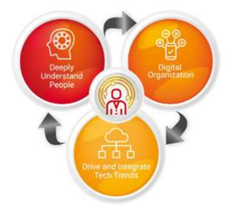Adoption of Digital Leadership Style in Guiding Deviant Behavior of Police Personnel at Metro Jaya Regional Police
Main Article Content
Valent Furi Hayati*
Basir S.
Yopik Gani
Digital leadership style emphasizes the leader's ability to understand information technology and digital systems, data-driven decision making and analysis, quick response to environmental and technological changes, emphasis on information transparency, innovation, creative thinking, and inspiring change. This scientific article aims to conceptualize the adoption of digital leadership in coaching against misconduct of Polri members at Metro Jaya Regional Police. The method used is a qualitative approach with descriptive analytics to provide detailed descriptions of occurring situations. The data used includes primary and secondary data. Data collection techniques include observation, interviews, and document studies. The author tests data accuracy and validity using triangulation techniques. Research results show that leadership at Metro Jaya Regional Police still faces several weaknesses such as being militaristic in nature, lacking measurable future digital vision, limited managerial capabilities, insight and understanding of technology-based transparency concepts, limited mastery of digital-based facilities and infrastructure, minimal problem-solving policing capabilities, and insufficient attention to digital development and environmental directions. Strategies that can be applied in implementing digital leadership in coaching against misconduct of Polri members at Metro Jaya Regional Police include establishing vision, mission, and strategic direction of digitalization in member coaching, building digital systems that support coaching and early detection of violations, improving personnel capabilities in using and managing digital systems, operating digital systems gradually and integrated into coaching processes, assessing implementation effectiveness and conducting continuous improvement, and making digital leadership an embedded work culture.
Brett, J. (2019). Evolving Digital Leadership How to Be a Digital Leader in Tomorrow’s Disruptive World. SpringerLink.
Cizmeci, B. (2020). Digital Leadership. In A Handbook of Leadership Styles. Cambridge Scholars Publishing.
Handoko, T. H. (2000). Manajemen personalia dan sumberdaya manusia. Penerbit Liberty.
Hasibuan, M. S. P. (2005). Manajemen sumber daya manusia edisi revisi. Bumi Aksara, Jakarta, 288.
Kane, G. C., Phillips, A. N., Copulsky, J., & Andrus, G. (2019). How digital leadership is (n’t) different. MIT Sloan Management Review, 60(3), 34–39.
Munir, N. S. (2020). Kepemimpinan di Era Digital (e-leadership). Retrieved December, 16, 2020.
Nurwicaksono, M. B. H., Dwilaksana, C., & Simanjuntak, P. J. (2023). Career Development Challenges in Strengthening the Performance of the POLRI Baintelkam. POLICY, LAW, NOTARY AND REGULATORY ISSUES, 2(4), 349–364. https://doi.org/10.55047/polri.v2i4.828
Pramita, C. (2023). IHRM: A Blibiometric Analysis. JOURNAL OF HUMANITIES, SOCIAL SCIENCES AND BUSINESS, 2(3), 425–433. https://doi.org/10.55047/jhssb.v2i3.597
Purbopranoto, K. (1978). Beberapa catatan hukum tata pemerintahan dan peradilan administrasi negara. Alumni.
Sedarmayanti. (2007). Manajemen sumber daya manusia, reformasi birokrasi, dan manajemen pegawai negeri sipil. Refika Aditama.
Soekanto, S. (1986). Sosiologi: suatu pengantar. Rajawali, Jakarta.
Tana, J., & Nita, S. (2024). The Law Enforcement by the Indonesian National Police (Polri) to Address the Triggers of Social Conflict During the 2019 Elections in Bandar Lampung. POLICY, LAW, NOTARY AND REGULATORY ISSUES, 3(1), 96–105.
Ulrich, D. (1997). Human resource champions: The next agenda for adding value and delivering results. Harvard Business Press.
Van Wart, M., Roman, A., Wang, X., & Liu, C. (2019). Operationalizing the definition of e-leadership: identifying the elements of e-leadership. International Review of Administrative Sciences, 85(1), 80–97. https://doi.org/10.1177/0020852316681446
















